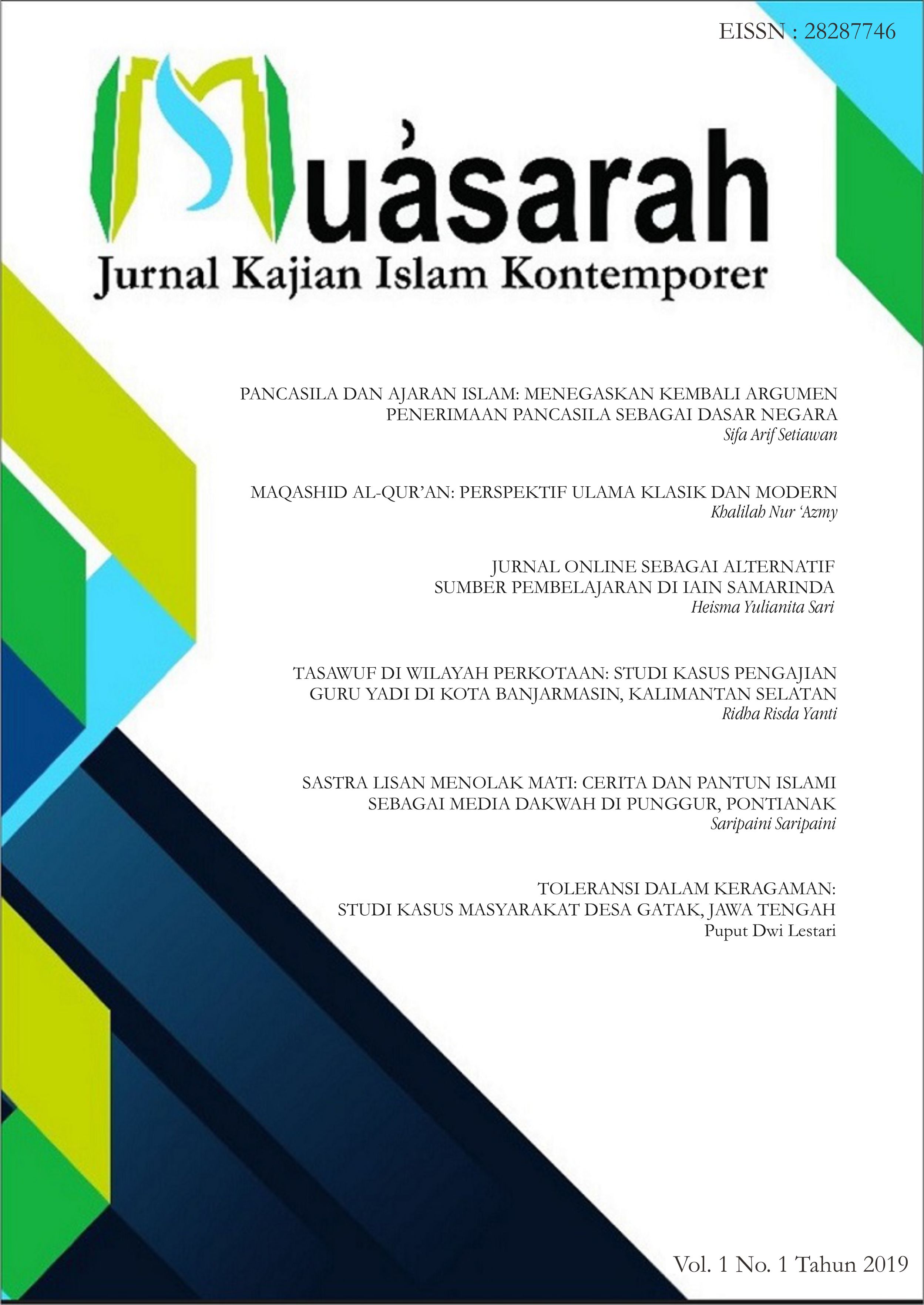SASTRA LISAN MENOLAK MATI: CERITA DAN PANTUN ISLAMI SEBAGAI MEDIA DAKWAH DI PUNGGUR, PONTIANAK
DOI:
https://doi.org/10.18592/msr.v1i1.3268Keywords:
Oral Literature, Islamic propagation, Media, Sastra lisan, DakwahAbstract
Abstract: Nowadays, television and gadget are so dominant in public and private places. The culture of watching TV and smart phones sidelines the tradition of listening to storytelling. But oral literature is not extinct with the advancement of communication and information technology. The case that this author found in Punggur Village, Pontianak, showed that oral literature, specifically, the religious genre, survived despite the bombardment of various entertainments broadcasted through electronic and digital media. Religious instructors in the village deliver moral messages to children learning al-Qur’an recitation through poems and stories. In fact, the method of storytelling has its own attraction in fostering children's interests to learn about religion. Abstrak: Dewasa ini, kehadiran televisi dan gawai begitu dominan di ruang publik dan privat. Budaya menonton TV dan ponsel pintar menggeser tradisi mendengarkan penuturan cerita secara lisan. Namun sastra lisan tidak punah diterjang perkembangan teknologi komunikasi dan informasi. Kasus yang penulis temukan di Desa Punggur, Pontianak, menunjukan bahwa sastra lisan, spesifiknya, yang bergenre agama, bertahan di tengah gempuran tontonan dan hiburan yang disiarkan melalui media elektronik dan digital. Di sana, guru-guru agama menyampaikan pesan moral kepada anak-anak yang belajar membaca al-Qur’an dengan menggunakan pantun dan cerita. Metode bercerita memiliki daya tarik tersendiri dalam menumbuhkan minat anak-anak untuk belajar agama.References
Alwani, Zainab. (2014). Maqâshid Qur’aniyyah: A Methodology on Evaluating Modern Challenges and Fiqh al-Aqalliyyat. The Muslim World. Vol. 104.
Al-Alwani, Thaha Jabir. (2005) Issues in Contemporary Islamic Thouht. London: The International Institute for Islamic Thought.
(2003) At-Tauhid, At-Tazkiyyah, Al-‘Umran. Beirut: Darul Hadi.
Al-Ghazali, Abu Hamid. (1984). Jawahir al-Qur’an. Beirut: Dar Ihya al Ulum.
Al-Ghazali, Muhammad. (1995). Nahwa Tafsir Mawdhu’i-Suwar al-Qur’an al-Karim. Kairo: Dar al Syuruq.
Al-Khatib, Ibnu. (2017). Maqashid al-Qur’an wa Ahammiyatuha fi Tahdid al-Mawdhu’ al-Qur’an, Dirasah Nashiyah fi Ba’dhi Kutub at-Tafsir wa Ulum al-Qur’an al-Karim.
As-Suyuthi, Jalaluddin. (2013). Al itqan fi ulum al quran (Vol. 5). Isha Books.
At-Thabari, A. T. (1997). Tafsir At-Thabari. Pustaka Azzam.
At-Tijani, Ali Al-Basyar Al-Faki. (2013). Maqashid Al-Qur'an Al-Karim wa Washilatuha bi at-Tadabbur. Al-Muktamar al-'Alimi li at-Tadabbur al-Qur'an, 1.
Islam, Tazul. (2013) The genisis and development of Maqasid al-Quran. American Journal of Islamic Social Science, 30.
Jamaruddin, Ade. (2015). Social Approach In Tafsir Al-Qur’an Perspective Of Hasan Hanafi. Jurnal Ushuluddin. Vol. 23.
Raisuni, Ahmad. (2013). Maqashidul Maqashid, al-Ghayat al-Ilmiyyah wa al. -‘Amaliyyah Limaqashid asy-Syari’ah. Dar Arabia lin-Nasr wa Abhats.
Ridha, Muhammad Rasyid. (2005). Tafsir al Manar. Kairo: Mathba’ah al-Manar.
Saeed, Abdullah. (2017). Paradigma, Prinsip dan Metode Penafsiran Kontekstualis atas Al-Qur’an. Yogyakarta: Baitul Hikmah Press2.
Thahir, T. (1984). Tafsir at-Tahrir wa at-Tanwir (Vol. 1). Tunisia: ad-Dar at-Tunisiyyah li an-Nasyr.
Warson, A. (1997). Kamus al-Munawwir Arab-Indonesia Terlengkap. In Kamus al-Munawwir (p. 1591). Pustaka Progresif.
Downloads
Published
How to Cite
Issue
Section
License
Authors who publish with this journal agree to the following terms:
- Authors retain copyright and grant the journal right of first publication with the work simultaneously licensed under a Creative Commons Attribution License that allows others to share the work with an acknowledgement of the work's authorship and initial publication in this journal.
- Authors are able to enter into separate, additional contractual arrangements for the non-exclusive distribution of the journal's published version of the work (e.g., post it to an institutional repository or publish it in a book), with an acknowledgement of its initial publication in this journal.
- Authors are permitted and encouraged to post their work online (e.g., in institutional repositories or on their website) prior to and during the submission process, as it can lead to productive exchanges, as well as earlier and greater citation of published work.






